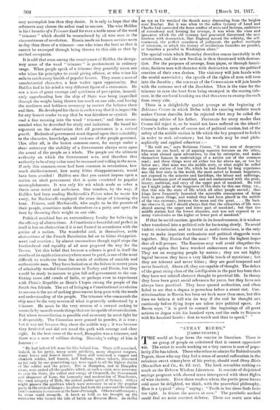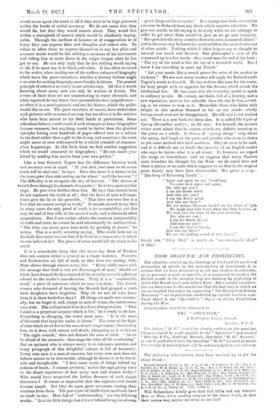T HE world at large loves the concise in literature. There
is no group of people so unlettered that it cannot appreciate wit. The artist in words working on a tiny canvas is sure of pops., larity if he has talent. Those who refuse to admire Sir Rabindranath Tagore, those who say they feel a sense of mental suffocation in the nebulous sweet atmosphere of his poetry, should read Stray Birds (Macmillan and Co., 4e. ed. net). The book resembles nothing so much as the Hebrew Wisdom Literature. It consists of disjointed sayings pregnant with shrewd sense interspersed with short flights of wise rhetoric. Even those readers whom the poetic prose leaves cold must be delighted, we think, with the proverbial philosophy. Here is a typical " stray " saying " Truth in her dress finds facts too tight. In fiction she moves at ease." The parabolic method could find no more succinct defence. There are many men who would never speak the truth at all if they were to be kept prisoners within the bonds of verbal accuracy. We do not mean that they would lie, but that they would remain silent. They would live within a stronghold of reserve which would be absolutely impreg- nable. Through the medium of humour or of exaggeration or of fancy they can express their real thoughts and •nohow else. To refuse to allow them to express themselves in any but plain and accurate words would be like robbing a musician of his instrument and telling him to write down in the vulgar tongue what he has got to say. He can only reply that he has nothing worth saying at all, if he must say it in black-and-white. It has often occurred to the writer, when reading one of the endless volumes of biography which leave the press nowadays, whether a literary fashion might ever arise for making biography more frankly fictitious. The present principle of selective accuracy is not satisfactory. All that is worth knowing about many men can only be written in fiction. The events of their lives are too uninteresting to repay chronicle, and when reported do but throw their personalities into insignificance— so often it is a man's portrait, and not his Mutely, which the public would like to see. The great novelists, of course, have undertaken such pictures with occasional success, but too often it is the satirists who have been moved to try their hands at portraiture. Some ridiculous failures would result if such attempts at fancy biographies became common, but anything would be better than the glorified epitaphs lasting over hundreds of pages offered now as a tribute to the dead rather than a gift to the living, and sometimes the truth might move at ease unhampered by a'trivial schedule of common- place happenings. In this little book we find another suggestion which we would commend to biographers " Do not insult your friend by sending him merits from your own pocket."
Like a true Oriental, Tagore has the difference between truth and accuracy ever in mind. " If you shut your door to all errors truth will be shut out," he says. Does this mean it is better to let the tares grow than risk rooting up the wheat " until the harvest " ? The difficulty is to recognize the day of harvest. " The stream of • truth flows through its channels of mistakes," he writes upon another page. He goes even further than this. He says that certain facts do not represent the truth at all ; that the heart of man will some- times give the lie to the provable. " That love can ever lose is a fact that we cannot accept as truth." It sounds absurd to say that in many cases the only proof of truth is its acceptability, yet this may be said of free will, of the musical scale, and a thousand other propositions. But if our author admits the constant inseparability of truth and error, he cannot be said intentionally to confuse them. " The false can never grow into truth by growing in power," he writes. This is a really arresting saying. Who could hold out in his faith that twice two arc four if he lived in a community in which no one believed it ? The power of error would kill the truth in his mind.
It is a remarkable thing that this latter-day Book of Wisdom does not contain either a cynical or a tragic sentence. Proverbs and Ecclesiastes are full of such, so that here our analogy fails. Hope shines through almost every line. " Every child comes with the message that God is not yet discouraged of man," should, we think, have formed the first instead of the seventy-seventh aphorism offered to the reader's consideration. Truly it is a " comfortable word," a piece of optimism which no man can deny. The Jewish women who dreamed of bearing the Messiah had grasped a truth their daughters have forgotten. Why do wo not all take heart from it in these leaderless days ? All things are made new continu- ally, but we forget it, and, except to men of vision, the world seems very stale. The real optimist lives in a fever of expectation. " That I exist is a perpetual surprise which is life," he is ready to declare, Everything is changing, the worst must pass. " It is the tears of the earth that keep her smiles in bloom."- The sense of the flight of time which never leaves the man of sad temperament, threatening him, as it does, with sorrow and death, whispering as it rushes on " The night cometh," does not disturb the man of faith. " Never be afraid of the moments—thus sings the voice of the everlasting." But an optimist who is always merry is an inhuman monster, and every paragraph of this delightful volume is full of humanity. Every wise man is a- man of sorrows, but every wise man does not believe sorrow to be irrevocable, although he knows it to be inevit- able and inexplicable. " I hear some rustle of things behind my sadness of heart,—I cannot see them," writes the sage, giving voice to the- dumb experience of how many men and women to-day ? Who would have suspected the Indian dreamer of such simple directness ? It 'seems so impossible that the sophisticated should become simple. Yet they do upon great occasions, casting their unctions from them. The purveyors of intellectual emollients have no trade to-day. How full of " understanding " are the following words : " It is the little things that I leave behind for my loved ones, —great things are for everyone." It is strange how little consolation can ever be deduced from any thesis which requires attention. We give our minds, as the saying is, to study when we are unhappy in order to get away from ourselves, just as we go into company. " Man goes into the noisy crowd to drown his own clamour of silence." and in the same way he forces his mind to follow the mental exercises of other minds. Nothing which it takes long to say or thought to unravel can touch real distress. Qur philosopher's view of life is summed up in a few words—they stand near the end of the book : " The cry of the wind is like the cry of a wounded world. But I know I am travelling to meet my Friend."
" Let your music, like a sword, pierce the noise of the market to its heart." We are sure many readers will apply Sir Rabindranath Tagore's words to himself. He has written this time for the many, for busy people with no appetite for the dreams which ravish the intellectual few. He has come into the everyday world to speak to ordinary people. He cannot, we think, fail of a hearing, and a new reputation, more or less valuable than the one he .has, accord- ing as we choose to look at it. Meanwhile those who listen_ with delight to this modern Oriental in his—to our minds--wholly foreign mood need not be disappointed. His old vein is not worked out. There is a new book for them also. It is called The Cycle of Spring (Macmillan and Co., 3s. Od. net). For himself; the preient writer must admit that he cannot attach any definite meaning to the poem as a whole. A chorus of " young things " sing about the spring, and laugh at the poets and pundits who seem to desire to put some method into their madness. They do seem to be mad, and it is difficult not to doubt the sincerity of an English reader who says he knows what it is all about. If, however, we regard the songs as translations—and we suppose that every Eastern must .translate his thought for the West—we do catch hero and there a phrase or an echo which suggests to us that in the original great beauty may have been discoverable. We quote a song- " The Song of Returning Youth " :--
" Again and again we say hood-bye,' To come back again and again.
Oh, who are you ?
1 am the flower yaks/.
Aud who are you ?
I am the. flower parul.
And who are these ?
We are mango blossoms landed on the shore of light.
We laugh and take leave when the time beckons us.
We rush into the arms of the ever-returning.
But who are you ?
1 am the flower shimul.
And who are you ?
1 ant the framini bunch, And who are these ?
We are the jostling crowd of new lean s."
Surely one "Stray Bird " is worth an " ueconstionable deal " of this !



























 Previous page
Previous page